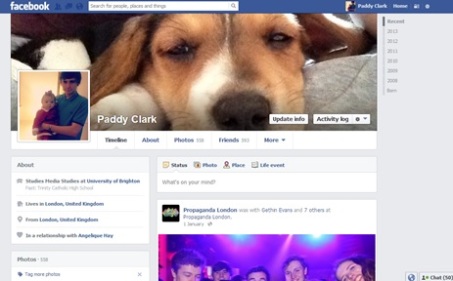Social networks allow individuals from all over the world to communicate and interact. Facebook was created in 2004 by five founders, most notably Mark Zuckerberg. It was originally created by Zuckerberg as a social network exclusive only to students of Havard and eventually expanded to allow students of colleges in the local area to join, then to students of all US universities, gradually developing to allow anyone with a registered email address worldwide to join. (Phillips, 2007). Shown above is my Facebook profile which I created in October 2008, over my time as a user on Facebook I have accumulated 593 friends, the majority of which I have personally met, in contrast to the growing trend of this social network of which users haven’t met the majority of their friends in person. The two central photos on my profile are the profile picture which is my god daughter and I, and the cover photo which is a photo of my dog. The profile shows information such as the area I live in, current and past education, and relationship status.
In this post I shall critically engage with my Facebook profile to discuss the follow themes: ‘Timelines’ and Histories: social media as the new frontier, and ‘Friend-Unfriend / Follow-Unfollow’: fandom, adulation and paranoia in the digital age for an assignment in the social media LM118 course for the media studies degree programme at University of Brighton, UK. The theme ‘Timelines’ and Histories: social media as the new frontier covers producing and consuming social media which was discussed in the first week of the LM118 course. To discuss these themes you need to define ‘producing’, ‘consuming’ and ‘social media’ in relation to social networks. ‘Producing’ is creating data yourself, writing a status or posting photos onto Facebook, ‘consuming’ would be reading and registering other individuals photos and status’, and ‘social media’ is a communication platform between a group of individuals. The term ‘prosumption’ is defined by Jurgenson and Ritzer (2010, 14) “Prosumption involves both production and consumption rather than focusing on either one (production) or the other (consumption)” which is what social networks involve, allowing the users not only to receive and consume media data, but also to contribute and produce social media themselves as Jurgenson and Ritzer (2010, 14) state “While prosumption has always been preeminent, a series of recent social changes, especially those associated with the internet and Web 2.0 (briefly the user-generated web, e.g. Facebook, Youtube, Twitter), have given it even greater centrality.” Which is a very accurate observation of the social media networks.
The concept of prosumption can be seen in the following photos of Facebook. Whilst using Facebook I am asked by the social network platform “What’s on your mind?” which if I reply to, will create a status or whatever I wish to type; through this I can also add a photo, my location or a life event. I am also asked to update information with questions such as, “Where have you worked?” or “What skills do you have?”, I am always offered the opportunity to contribute data onto the social network site, allowing others to know more about myself, however, there is no specific emphasis on just producing, as I am also encouraged to consume by the Facebook timeline where I can view others status’, locations, and photos, such as the status in the photo below, where a friend has shared an external link to an article. I can also view other individuals comments on this status, allowing me to consume, however, again there is no specific emphasis on just one of the ‘producing’ or ‘consuming’ purposes of Facebook as I can like the status, like peoples comments, share the status or even write a comment myself allowing me to produce the social media just as much as I am consuming it.
As David Goff states (2013, 16) “Not only is abundant media content now consumed wherever and whenever the consumer desires, consumers increasingly generate media content as they utilize the fastest growing segments of online media, social media.” which further supports the concept of prosumption, especially in relation to social networking. Consumers don’t just take the role of consumers now on social networking sites, they are the producers themselves. It changes the position that without producers there is no consumers and creates a new view that the consumers are intrinsic to other consumers, there cannot be audience for presuming with both producing and consuming.
The next theme I will be discussing while critically engaging with my profile is friending, unfriending, and gain, concerning popularity, in relation to the ‘Friend-Unfriend / Follow-Unfollow’: fandom, adulation and paranoia in the digital age, which was explored in week two of the LM118 course. Many people’s views on the idea of friending and unfriending are rather negative, as it has become a representation of an individual’s social status, the number of friends is available on people’s profiles to everyone with access to that profile, and adjusted every time they gain or lose a friend. The fact that this number of friends is public points towards strategic friending behaviour which results to self-presentational concerns (Lee, at el, 2012). I agree with this view in the sense that many people on Facebook do add people that they either don’t know at all or just have mutual friends with to either to make new friends and communicate with them or just to have more friends on their profile to make themselves seem more popular, advancing their popularity status in reality, with the latter being the more common of the two. You can see in the photo below that I have multiple friend requests from people I have only have a few mutual friends with, suggesting that I probably do not know them in real life (hence why these requests haven’t been accepted). It would also seem that Facebook encourages users to add others by suggesting ‘People you may know’ even if you don’t have any mutual friends with the people at all.
However, whilst I do agree with the view it isn’t true all the time, for instance I haven’t accepted the friend requests shown in the photo as I don’t actually know the individuals who have sent me friend requests, out of the 593 friends I do have on Facebook I would estimate that only about 50 of them I haven’t met in person, and I myself never send friend requests to strangers, but there is still the fact of while I am not adding strangers and accepting their requests, there are still strangers sending me requests, and admittedly out of the 593 Facebook friends, 50 of which I haven’t met, I am not in regular contact with all of them and many of them are probably people I have just spoken to on a few occasions and we’ve added each other as friends on Facebook.
“… popular press coverage which has primarily focused on negative outcomes of Facebook use stemming from users’ misconceptions about the nature of their online audience…” (Ellison, et al, 2007, 1143-1168). Whilst Ellison is making a point of the studies being conducted, she makes a very valid point about the popular press coverage of Facebook, and how it is always being mocked in the media about how ridiculous it is to have a large amount of friends on Facebook whereas individuals probably only regular communicate with about 50. For example there is an article claiming that the human mind has a limited amount of capacity for social relationships, and Facebook cannot improve this (Connor, 2014). Due to this the stereotype of Facebook created by the media, it has generated an idea to the people who don’t use Facebook that it is just a site where everyone is friends with everyone even if they have no clue who they are.
In conclusion I believe that, in terms of theme of consuming, producing and prosumption, Facebook is a perfect example of prosumption, perfect for the capitalistic culture it is usually used it, it produces its own data to be consumed, and allows the audiences to become its own audience. Such as the text by Jurgenson, Ritzer and Goff who all suggest that while prosumption has always existed social media networks sites such as Facebook have increased its used, and advanced consumers to producers.
In terms of themes of friending, unfriending and popularity it is very controversial, on one hand it creates a self-conscious feeling around individuals concerning popularity among individuals, however on the other it doesn’t necessarily mean all individuals on Facebook are concerned with the popularity concerning have more friends than another individual.
Lee, Moore, and the Park’s successfully discusses the negative feeling towards the concept of friending and unfriending on Facebook due to the bad effects it can lead to such as the self-conscious of popularity, and Ellison clearly shows how media isn’t helping the concept any further with its negative reviews of the concept.
Bibliography
Connor, S. (2014). Despite social networks like Facebook and Twitter, most people will only ever have a handful of good friends. Available: http://www.independent.co.uk/life-style/gadgets-and-tech/news/despite-social-networks-like-facebook-and-twitter-most-people-will-only-ever-have-a-handful-of-good-friends-9042188.html. Last accessed 9th January 2014.
Ellison, N., Steinfield, C., Lampe, C.. (2007). The Benefits of Facebook “Friends:” Social Capital and College Students’ Use of Online Social Network Sites. Journal of Computer-Mediated Communication . 12 (4), 1143-1168.
Goff, D. (2013). A History of the Social Media Industries. In: Albarran, AThe Social Media Industries . London: Routledge. 16.
Jurgenson, N & Ritzer, G. (2010). Production, Consumption, Prosumption. Journal of Consumer Culture. 10 (1), 14.
Lee, J., Moore, D., Park, E., Park, S.. (2012). Who wants to be “friend-rich”? Social compensatory friending on Facebook and the moderating role of public self-consciousness. Computers in Human Behavior. 28 (3), 1037.
Phillips, S. (2007). A brief history of Facebook. Available: http://www.theguardian.com/technology/2007/jul/25/media.newmedia. Last accessed 9th January 2014.




